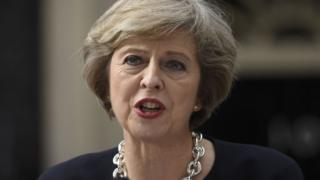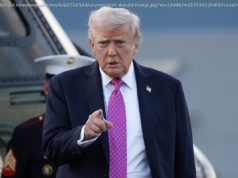 The pound dropped below $1.20 on Sunday ahead of a key speech from Theresa May on Brexit this week.
The pound dropped below $1.20 on Sunday ahead of a key speech from Theresa May on Brexit this week.
Sterling hit its lowest level against the dollar since October’s flash crash before later edging back up slightly.
Analysts said traders were reacting negatively to reports that the prime minister would signal plans on Tuesday to quit the EU single market.
The pound has now fallen about 20% against the dollar since the referendum to lows last regularly seen in 1985.
The pound also dropped to a two-month low against the euro on Sunday, falling more than 1% to about €1.13.
It comes as US President-elect Donald Trump said in an interview with The Times that the fall in the pound was «great» for British business.
Mr Trump suggested his Scottish golf course in Turnberry had benefited from the fall in the value of sterling, and that «business is unbelievable in a lot of parts in the UK».
A weaker pound helps make UK firms more competitive abroad, but it also makes foreign holidays and imported goods more expensive.
Several of Sunday’s newspapers claimed Mrs May would this week outline a «hard Brexit» approach, a term used to imply prioritising migration controls over single market access.
Downing Street has described this as «speculation».
The currency movement, though, was «clearly another political drop for sterling», said Jasper Lawler, an analyst at London Capital Group.
«The pound is now back into flash crash territory,» Mr Lawler added.
The flash crash on 7 October saw the pound drop to its lowest post-referendum level — below $1.19 — before recovering.
Reports of the UK leaving the single market are «like kryptonite» to traders who back the pound, said Kathleen Brooks, an analyst at City Index.
«The FX market has spoken, and, as of Sunday night, it is not confident that Theresa May can deliver the necessary clarity and confidence when she lays out her Brexit plans in a speech on Tuesday,» Ms Brooks said.
Even though Mrs May has been linked to a «hard Brexit» approach before, it is seen by many traders as a downside for the pound, and so every headline can «generate another wave of selling», she added.
Laith Khalaf, an analyst at Hargreaves Lansdown, said: «The pound is tethered to expectations of a hard or soft Brexit. »
Analysts at Societe Generale said many in the market believe it likely the UK will leave the single market, because of Mrs May’s determination to have control over immigration and not to be subject to the European Court of Justice.
«The question then becomes just how close a trade arrangement the UK will be able to obtain,» they added.
The pound has been volatile since the Brexit vote, partly due to uncertainty about the economic impact if the UK gives up its tariff-free access to the EU.
Trading in sterling can be more volatile in Asian markets, when key sterling counter traders in London and other important Western markets are not operating.
A report on Friday said October’s flash crash, which came during Asian trading, was due to a range of factors, including the time of day.






